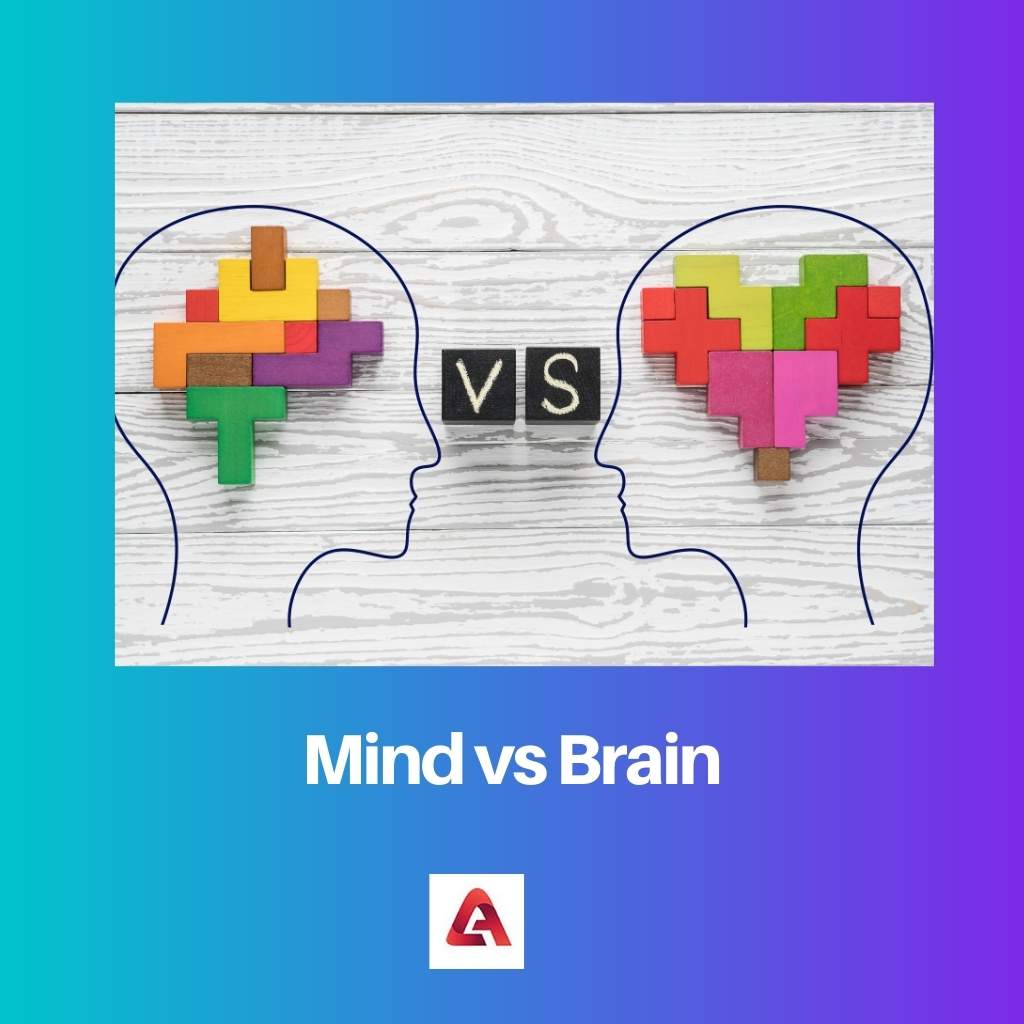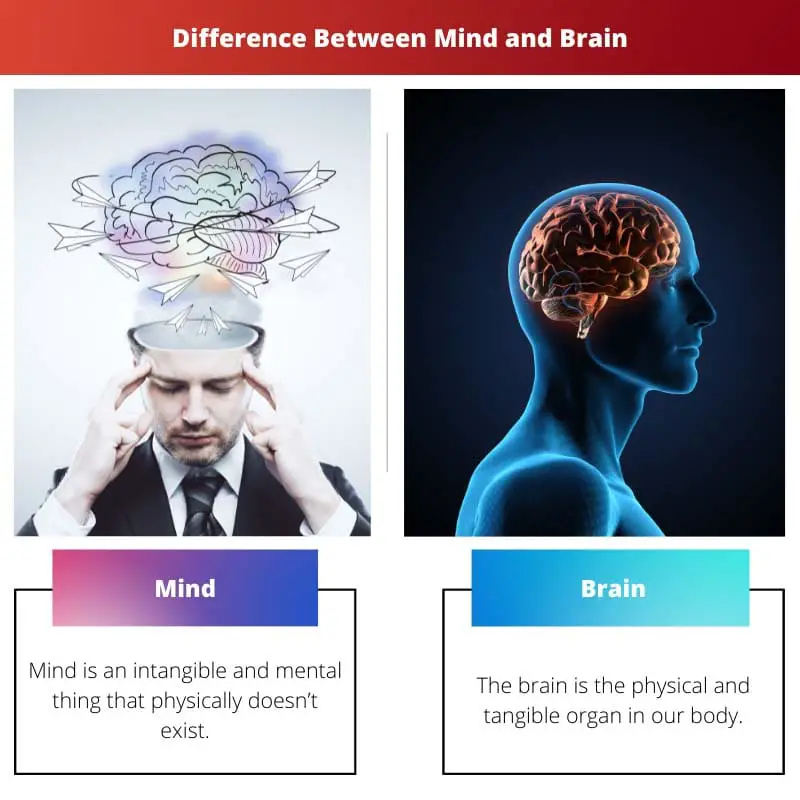Brain and Mind are both confused with the same thing and are used interchangeably. What is the use of hardware if there is no software?
Will it work? Similarly, the brain is hardware that is incomplete without a mind.
The brain allows to do functioning the body, but the energy, and the thoughts it gains from the mind. The mind works like software and does all the rational thinking.
Key Takeaways
- The brain is a physical organ composed of neurons, while the mind represents thoughts, emotions, and consciousness.
- The brain can be observed and studied scientifically, but the mind remains a complex, abstract concept.
- Understanding the brain contributes to advancements in neuroscience, whereas exploring the mind influences fields like psychology and philosophy.
Mind vs Brain
The brain is a physical organ located in the skull, consisting of billions of neurons that communicate with each other through electrical and chemical signals. The mind is a subjective experience of consciousness, including thoughts, emotions, perceptions, beliefs, and memories. It is the subjective aspect of mental processes that are associated with the brain.

Mind is a mental and intangible thing that is like software. It cannot be touched or felt.
It has no definite shape or structure. It defines how a person understands certain things and his thought process.
The mind produces energy, and without the mind, the brain is useless. It is a hypothetical thing which is which gives us the energy to think.
The brain is a tangible and complex organ of our body that is not hypothetical. It is a physical thing that can be touched and felt.
It has a definite shape and structure and is made up of a thousand billion nerve cells and billions of blood vessels. Its function is to coordinate the movements and feelings of the body.
Comparison Table
| Parameters of Comparison | Mind | Brain |
|---|---|---|
| Definition | Mind is an intangible and mental thing that physically doesn’t exist. | The brain is the physical and tangible organ in our body. |
| Shape | It has no defined shape and structure. | It has shape and structure. |
| Function | Mind is responsible for how we think, how we understand and process things. | The brain is something that helps us in coordinating the movements, feelings and is called the center of the nervous system. |
| Touch | The mental thing that doesn’t present physically can’t be touch. | Yes, it can be touched and felt by the hands. |
| Production | Since the mind doesn’t exist physically, it has no blood vessels and nerve cells. | Since the brain is a physical thing, it is made up of blood vessels and nerve cells. |
What is Mind?
The mind, which is known same as the brain, is not a physical organ present in the body. It is just a mental thing that cannot be touched and felt.
It doesn’t have any shape or structure. Unlike brains, it is not up of any blood vessels and nerve cells.
The mind is only supposed to be in the brain. The mind cannot get any disease.
Mind is something that provides us energy to think, process, decide, evaluate and perceive things. The brain just responds to these energies.
Without a mind, the brain is useless. Mind ensures us that we have that energy to think, and it’s our aliveness.
It consists of three levels that are – Conscious, Subconscious, and Unconscious. The conscious mind is referred to immediate experiences.
Mind is one of the most powerful things, which can create or destroy. It has no limits on how much we think or what wonders we can think.
Mind is limitless.

What is Brain?
The brain is a tangible, physical organ of our body. Unlike the mind, it can be touched and felt.
It is made up of blood vessels and billions of nerve cells. It has a definite shape and structure and has weight.
It weighs around 3 pounds, and it contains 60% of fats. It is the central nervous system that coordinates the movement of our body. It translates the actions, the feelings, and the content of the mind, such as thoughts, beliefs, and imagination.
It is supposed to be in the head, and unlike the mind, the brain can get the disease and get diagnosed with any medical condition.
It is responsible for all receiving and distributing the information to the body parts. It is the most complex organ which produces our memory, thought, expression, and actions.
It is divided into 3 main parts-cerebrum, the cerebellum, and the brainstem.
The cerebrum is the largest part of the brain, whereas the cerebellum is situated just below the cerebrum and coordinates movements.
The brainstem is responsible for the connection of the cerebellum and cerebrum to the spinal cord.

Main Differences Between Mind and Brain
- Mind is a hypothetical and mental thing that does not exist, whereas the Brain is a tangible and physical thing that is an organ in the body.
- The mind has no definite shape and structure which can be touched, whereas the Brain has a shape and structure which can be touched.
- Since the mind is not physically present, there is no question about its production, whereas the Brain exists and is made up of a thousand billion nerve cells and millions of blood vessels.
- The mind has three main levels that are conscious, subconscious, and Unconscious, whereas the Brain has three different parts that are cerebellum, cerebrum, and brainstem.
- Mind is used for rational thinking, and it’s the thought process of a person, how a person thinks and understands, whereas the Brain is responsible for coordinating the movements and actions of the body. Without a mind, the brain is useless.

- https://www.jstor.org/stable/24939212
- https://www.sciencedirect.com/science/article/pii/S0301008206000207

The distinction between the mind and brain is very well explained here. It’s an essential concept to grasp.
The article does a great job of presenting the mind and brain as distinct entities with their unique functions.
This is a fascinating read, and the explanations are clear and comprehensive.
Absolutely, the article provides valuable insights into the mind and brain and their contributions to different fields.
The article provides valuable insights into the complexities of the mind and brain, allowing for a deeper understanding of human cognition and consciousness.
Absolutely, the distinctions outlined here are crucial, and the article offers a comprehensive analysis of the mind and brain.
Thanks for this eye-opening article! This information is crucial to understanding the complexities of the human mind and brain.
I never really thought about the mind and brain in this way before. This article really got me thinking.
I agree, it’s fascinating how the mind and brain work together but are distinct in their functions.
I appreciate the in-depth analysis of the mind and brain presented in this article. It’s thought-provoking and enlightening.
This is a comprehensive breakdown of the mind and brain. It contributes greatly to scientific and philosophical discussions.
Absolutely, the information provided here really enhances our understanding of the mind and brain.
This comparison between the mind and brain is very informative. It highlights the importance of understanding the two as separate entities.
I agree, having a clear understanding of the different roles of the mind and brain is crucial to understanding ourselves and consciousness.
I appreciate the clarity provided in this article. It’s an important topic and the explanations are very helpful.
The information provided here is enlightening. It brings clarity to the distinction between the mind and brain.
I appreciate the depth of detail provided in this article. It’s a great educational resource.
Absolutely, understanding these concepts is essential for various scientific and philosophical discussions.
This article emphasizes the importance of recognizing the differences between mind and brain and appreciating their individual roles.
The comparison table provided is very useful for understanding the key differences between the mind and brain.
The clarity in the comparison table really makes it easier to comprehend the distinct functions of the mind and brain.
Absolutely, it helps to clarify some of the misconceptions that exist about the mind and brain.
This article serves as a reminder of the importance of exploring the mind and brain in different fields and the advancements it brings.